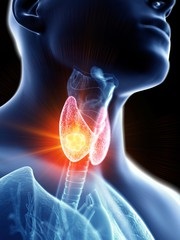Thyroid dysfunction is a common condition and often goes misdiagnosed. The thyroid gland, a small butterfly-shaped gland that sits around the trachea is in control of metabolism and temperature control.
Why is this important?
The thyroid works intimately with adrenal function. This is why patients with thyroid dysfunction will invariably experience adrenal fatigue. 10–15% of the population have positive thyroid antibodies contributing to the increasing statistic of Hashimotos disease.
A wide range of factors from hormone imbalances, mood disorders to mineral deficiencies and environmental pollutants can interfere with thyroid production, leading to health problems.
Dysfunction is Notoriously Under-Diagnosed
TSH is the primary marker of thyroid assessment. Imbalances of TSH can recognize functional or sub-clinical hypothyroidism often left undetected.
Hypothyroidism affects more women than men and particularly after the age of 50. Statistics show that women are seven times more likely than men to develop thyroid problems, facing as much as a one in five chance of developing a problem particularly during the peri-menopause years when hormones start to fluctuate.
The importance of detecting and treating sub-clinical hypothyroidism is essential especially due to the connection between the thyroid and mood or hormones.
Learning Outcomes
In this webinar, you will learn:
- Functions of the Thyroid Gland
- Thyroid Hormones, Antibodies and Iodine
- How does Thyroid affect mood or hormones?
- Testing for thyroid function
- Managing thyoid problems naturally
Video
Video Duration: 1:17:00
This offering provides CPD continuing professional development credits for












